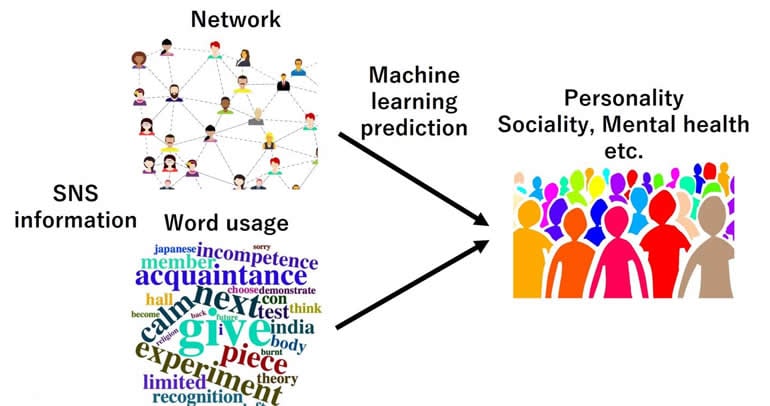Summary: Personality traits, such as empathy and extraversion, could be predicted from specific network features. Other personality traits, lifestyle, and mental health status can be predicted from language use on social media platforms.
Source: NICT
Principle Investigator HARUNO Masahiko and Dr. MORI Kazuma at the Center for Information and Neural Networks (CiNet), the National Institute of Information and Communications Technology (NICT, President: TOKUDA Hideyuki, Ph.D.), report the use of machine learning to analyze behavior on Twitter and predict a wide range of personality traits and attributes such as intelligence and extraversion. Specifically, the study uses component-wise gradient boosting to demonstrate that network features, such as the number of Tweets and the number of likes, and word usage on Twitter are predictive of social (e.g., extraversion) and mental health (e.g., anxiety) personalities, respectively. This approach may provide a new way for mental health diagnostics and personalized nudges.
The new study was published in Journal of Personality online on Thursday, August 20, 2020.
Social media services (SNS) have quickly become universal tools for communication. Previous research has shown that information about Facebook and Twitter use can reveal basic and course personality traits based on the Big 5. However, which types of SNS information can be used to pinpoint specific personality traits and attributes are unknown. There is growing interest about what personality traits and attributes can be predicted by analyzing SNS information and how accurately that information reflects the user.
The study by Dr. MORI and Principle Investigator HARUNO discovered that a wide range of personality traits and attributes can be predicted by analyzing four different types of users’ behaviors on Twitter (i.e., network features, time, word statistics, and word usage).
A statistical analysis found significant correlations between measured personality and attribute scores and predicted ones, with correlation coefficients around 0.25. This value is not sufficient for determining an individual’s personality traits precisely, but with a large enough population sample, this technology can provide informative results.
The study collected social media information from 239 participants (156 men, 83 women; average age 22.4 years old) who also took personality tests that measured 24 personality traits and attributes (52 subscales). Of the 52 subscales, the Twitter information could be reliably used to predict 23 of them. The study showcases a positive correlation (correlation coefficient = 0.44) between the measured and predicted Big 5 extraversion scores based on a 10-fold cross-validation procedure done 10 times (Bonferroni corrected p value of 0.05/52).

The analysis revealed that several social personality traits such as extraversion, empathy and autism could be predicted from network features. Other personality traits such as socioeconomic status, smoking/drinking, and even depression or schizophrenia were predictable from the language usage features. Prediction from time was more difficult to correlate with measured personalities, but did show a significant correlation with intelligence and social value orientation.
We are expanding the analysis to thousands of subjects. The method described in this study could be used to for mental health diagnostics and personalized nudges to act on people’s behaviors. It will also give insight on the neural mechanisms underlying individual differences in personality traits.
About this psychology research article
Source:
NICT
Contacts:
HIROTA Sachiko – NICT
Image Source:
The image is credited to National Institute of Information and Communications Technology (NICT).
Original Research: Open access
“Differential ability of network and natural language information on social media to predict interpersonal and mental health traits” by Kazuma Mori and Masahiko Haruno. Journal of Personality.
Abstract
Differential ability of network and natural language information on social media to predict interpersonal and mental health traits
Objective
Previous studies have shown that digital footprints (mainly Social Networking Services, or SNS) can predict personality traits centered on the Big Five. The present study investigates to what extent different types of SNS information predicts wider traits and attributes.
Method
We collected an intensive set of 24 (52 subscales) personality traits and attributes (N = 239) and examined whether machine learning models trained on four different types of SNS (i.e., Twitter) information (network, time, word statistics, and bag of words) predict the traits and attributes.
Results
We found that four types of SNS information can predict 23 subscales collectively. Furthermore, we validated our hypothesis that the network and word statistics information, respectively, exhibit unique strengths for the prediction of inter‐personal traits such as autism and mental health traits such as schizophrenia and anxiety. We also found that intelligence is predicted by all four types of SNS information.
Conclusions
These results reveal that the different types of SNS information can collectivity predict wider human traits and attributes than previously recognized, and also that each information type has unique predictive strengths for specific traits and attributes, suggesting that personality prediction from SNS is a powerful tool for both personality psychology and information technology.






